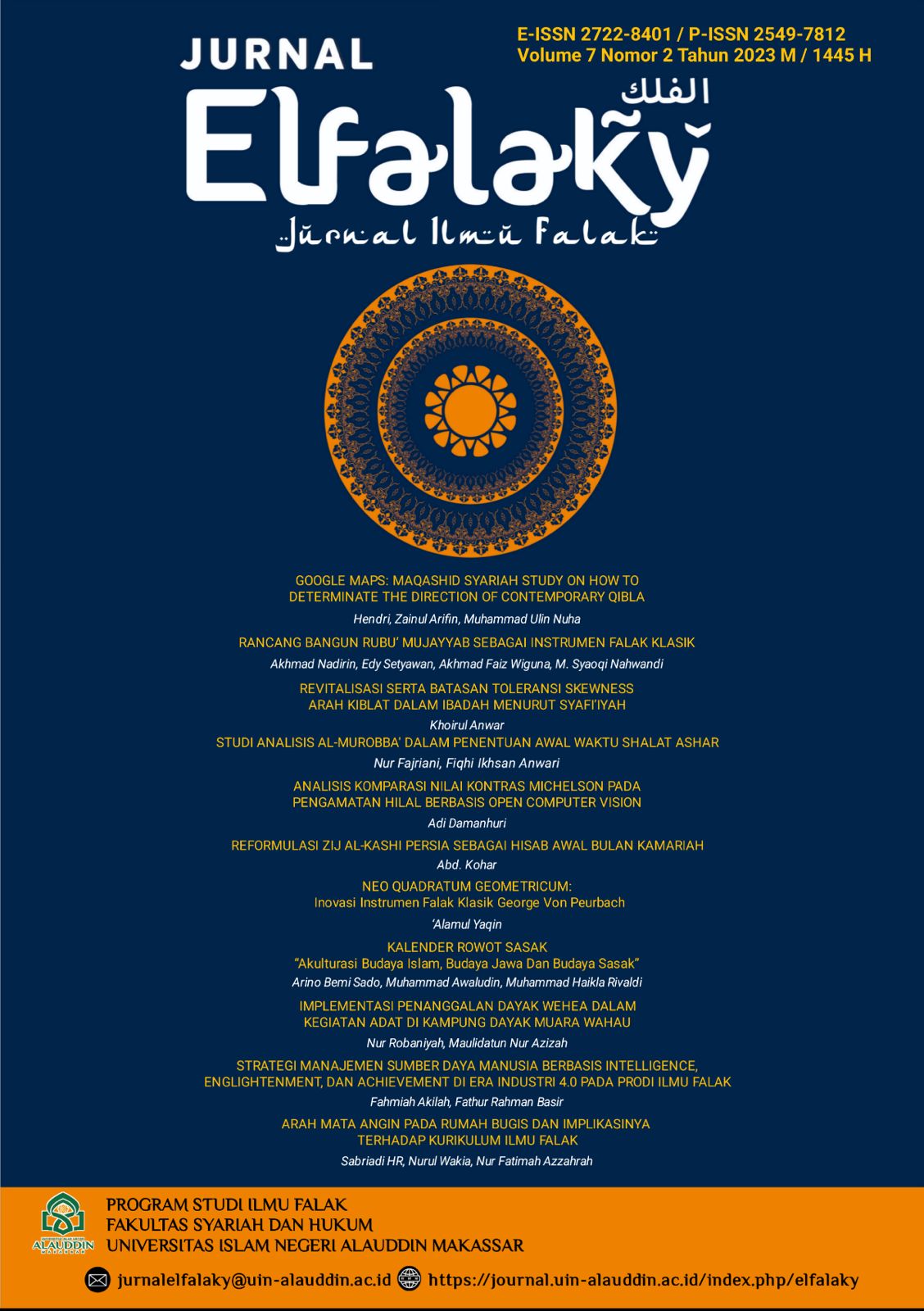RANCANG BANGUN RUBU’ MUJAYYAB SEBAGAI INSTRUMEN FALAK KLASIK
Abstrak
Astronomical Instruments or Astronomy is a scientific icon that is clear evidence of the development of Astronomy in classical Western and Islamic civilization. Even though the classical Falak instrument is simple, it holds extraordinary scientific treasures. Rubu' Mujayyab is an instrument used by humans to observe and calculate the positions of celestial bodies before telescopes and logarithm tables were invented. In the current era of technological development, Classical Falak Instruments such as the Rubu' Mujayyab need to be developed and adapted to technological advances into software or digital applications in order to continue to exist. This research aims to design the Javascript-based Rubu' Mujayyab application and determine the results of functionality testing and evaluation of the Javascript-based Rubu' Mujayyab digital application. This research was conducted using the Research and Development method. In this research, the classical astronomical instrument was digitally developed using the JavaScript programming language. The Falak instrument developed is Rubu' Mujayyab. This instrument is a classic astronomical instrument which is still relevant to current conditions and is widely used in studying astronomy in Madrasas, Islamic boarding schools and Islamic universities. After the digital application of the classic astronomical instrument was created, it was then validated with an instrument validation sheet by an Expert Researcher from Imah Noong, Lembang, namely Hendro Setyanto, as well as testing the functionality of the two applications. The result is a classic digital falak application, namely rubu' al-mujayyab itself. Apart from that, based on the results of functionality tests by Expert Researchers, it was found that this digital application can run and function well according to the function of the physical instrument.
Referensi
Ardliansyah, M. F., “Kajian Perangkat Hisab Rukyat Nusantara: Rubu’ Mujayyab dan Astrolabe dalam Hisab Awal Waktu Salat,” Jurnal Bimas Islam, 8 (1) (2015), 1–30
Arikunto, S., Prosedur Penelitian Suatu Pendekatan Praktik (Jakarta: Rineke Cipta, 2010)
Charette, Francois, Trigonometric Instruments. In Mathematical Instrumentation in Fourteenth-Century Egypt and Syria, Brill, 2003
Chaucer, G, A Treatise on the Astrolabe (Vol. 6) (Oklahoma: University of Oklahoma Press, 2002)
Direktorat Pendidikan Tinggi Keagamaan Islam, Standar Kompetensi Lulusan dan Capaian Pembelajaran Lulusan Program Studi Jenjang Sarjana pada Perguruan Tinggi Keagamaan Islam dan Fakultas Agama Islam pada Perguruan Tinggi (Jakarta, 2018)
Drozdek, Adam, Data Structures and Algorithms in Java (4th Edition) (Singapore: Cengage Learning Asia, 2013)
Hardianty, Dini Agnia, Indra Yustiana, dan S Somantri, “Rancang Bangun Aplikasi E-Learning Berbasis Progressive Web Apps Untuk Menunjang Pembelajaran Online dengan Metode Prototyping,” J-SAKTI (Jurnal Sains Komputer dan Informatika), 6.2 (2022), 754–65
Hidayat, M., Setiawan, H. R., Rakhmadi, A. J., & Putraga, H., “Pemanfaatan Astrolabe dalam Perhitungan Waktu Shalat di SMA Sains & Tahfidz Al-Ammar Tanjung Morawa,” Jurnal SOLMA, 10 (3) (2021), 524–31
Indraswati, L. N. F., “Rubu’ Mujayyab sebagai Alat Hisab Rashdul Kiblat,” Ahkam: Jurnal Hukum Islam, 8 (1) (2020)
Nahwandi, M. Syaoqi, “Modifikasi Gunter’s Quadrant sebagai Instrumen Hisab Awal Waktu Salat” (UIN Walisongo Semarang, 2019)
———, “Pengaplikasian Astrolabe dalam Hisab Awal Waktu Shalat,” Al-Mizan, 14 (1) (2018), 105–21
Poo, D., Kiong, D., & Ashok, S., Object-oriented Programming and Java (Springer Science & Business Media, 2007)
Prastowo, Andi, Metode Penelitian Kualitatif dalam Perspektif Rancangan Penelitian (Jogjakarta: Ar-Ruz Media, 2012)
Purnomo, Dwi, “Model Prototyping,” JIMP-Jurnal Informatika Merdeka Pasuruan, 2.2 (2017), 54–61
Ramdhani, F. Z, “Kontribusi Pemuda dalam Digitalisasi Ilmu Falak pada Aplikasi Islamicastro dan Faza Haul” (UIN Sunan Ampel Surabaya, 2020)
Safiai, M. H., Ibrahim, I. A., Jamsari, E. A., Ahmad, M. Y., & Nasir, B. M, “The Continuity of Astrolabe as a Multipurpose Astrofiqh Instrument,” International Journal of Applied Engineering Research, 11 (9) (2016), 6081–86
Safiai, Mohd Hafiz, Mohamad Zulfazdlee Abul Hassan Ashari, Ezad Azraai Jamsari, Ibnor Azli Ibrahim, dan Noorsafuan Che Noh, “Astrolabe alternative learning based on software and interactive application,” International Journal of Advanced and Applied Sciences, 8.6 (2021), 103–9 <https://doi.org/10.21833/ijaas.2021.06.012>
Sakirman, S, “Spirit Budaya Islam Nusantara dalam Konstruksi “Rubu Mujayyab",” Endogami: Jurnal Ilmiah Kajian Antropologi, 1 (2) (2018), 114–23
Sugiyono, Metode Penelitian Pendidikan (Bandung: Alfabeta, 2015)
Zaki, N. H. A., Zainuddin, M. Z., Ali, A. K., Wahab, R. A., Nawawi, M. S. A. M., Niri, M. A., & Ismail, K., “Penentuan Waktu Solat Subuh Menggunakan Rubu’ Mujayyab di Malaysia,” Jurnal Fiqh, 11 (2010), 97–118





